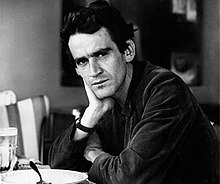Gonzalo Arango Arias | |
|---|---|
 Archivo de El Tiempo | |
| Born | January 18, 1931 Andes, Colombia |
| Died | September 25, 1976 (aged 45) Gachancipá, Colombia |
Gonzalo Arango Arias (Andes, Antioquia, 1931 – Gachancipá, Cundinamarca, 1976) was a Colombian writer, poet, and journalist. In 1958 he led a modern literary and cultural movement known as Nadaism (Nothing-ism),[1][2] inspired by surrealism, French existentialism, beat generation, dadaism, and influenced by the Colombian writer and philosopher Fernando González Ochoa.
Arango's life was characterized by large contrasts and contradictions, from an open atheism to an intense spirituality.[3] Those contrasts can be observed between the Primer manifiesto nadaísta (1958), or Prosas para leer en la silla eléctrica (1965), and his last writings.[4]
He was a strong critic of the society of his time and in his works he left many important ideas and proposals.[5]
He was planning to move to London with the British Angela Mary Hickie, but ended his life in a car accident in 1976.[6]
- ^ Pensamiento Colombiano Del Siglo XX, Volume 2, Page 199
- ^ National Geographic Traveler: Colombia - Page 51 Christopher Baker - 2012
- ^ Jaramillo, Maria Dolores. "Lo ético del nadaísmo".
- ^ Escobar, Eduardo (2023). Memorias sobre los vaivenes ideológicos de Gonzalo Arango al lado de su última novia, la inglesa. Angela Hickie (Historia de un cuadro ed.). Medellín: Universocentro.
- ^ Arango, Gonzalo, Primer manifiesto nadaista, 1958, gonzaloarango.com. Link retrieved on June 10, 2008.
- ^ Vélez Escobar, Juan Carlos, Hace 25 años se mató Gonzalo Arango, en gonzaloarango.com.